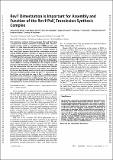Rev7 dimerization is important for assembly and function of the Rev1/Polζ translesion synthesis complex
Author(s)
Rizzo, Alessandro A.; Li, Yunfeng; Hao, Bing; Korzhnev, Dmitry M.; Vassel, Faye-Marie; Chatterjee, Nimrat; D'Souza, Sanjay Victor; Hemann, Michael; Walker, Graham C.; ... Show more Show less
DownloadMain article (5.614Mb)
PUBLISHER_POLICY
Publisher Policy
Article is made available in accordance with the publisher's policy and may be subject to US copyright law. Please refer to the publisher's site for terms of use.
Terms of use
Metadata
Show full item recordAbstract
The translesion synthesis (TLS) polymerases Polζ and Rev1 form a complex that enables replication of damaged DNA. The Rev7 subunit of Polζ, which is a multifaceted HORMA (Hop1, Rev7, Mad2) protein with roles in TLS, DNA repair, and cell-cycle control, facilitates assembly of this complex by binding Rev1 and the catalytic subunit of Polζ, Rev3. Rev7 interacts with Rev3 by a mechanism conserved among HORMA proteins, whereby an open-to-closed transition locks the ligand underneath the “safety belt” loop. Dimerization of HORMA proteins promotes binding and release of this ligand, as exemplified by the Rev7 homolog, Mad2. Here, we investigate the dimerization of Rev7 when bound to the two Rev7-binding motifs (RBMs) in Rev3 by combining in vitro analyses of Rev7 structure and interactions with a functional assay in a Rev7−/− cell line. We demonstrate that Rev7 uses the conventional HORMA dimerization interface both to form a homodimer when tethered by the two RBMs in Rev3 and to heterodimerize with other HORMA domains, Mad2 and p31comet. Structurally, the Rev7 dimer can bind only one copy of Rev1, revealing an unexpected Rev1/Polζ architecture. In cells, mutation of the Rev7 dimer interface increases sensitivity to DNA damage. These results provide insights into the structure of the Rev1/Polζ TLS assembly and highlight the function of Rev7 homo- and heterodimerization. Keywords: DNA damage tolerance; translesion synthesis; protein--protein interactions; protein structure; HORMA domain proteins
Date issued
2018-08Department
Massachusetts Institute of Technology. Department of Biology; Koch Institute for Integrative Cancer Research at MITJournal
Proceedings of the National Academy of Sciences
Publisher
National Academy of Sciences (U.S.)
Citation
Rizzo, Alessandro A. et al. “Rev7 Dimerization Is Important for Assembly and Function of the Rev1/Polζ Translesion Synthesis Complex.” Proceedings of the National Academy of Sciences 115, 35 (August 2018): E8191–E8200 © 2018 National Academy of Sciences
Version: Final published version
ISSN
0027-8424
1091-6490